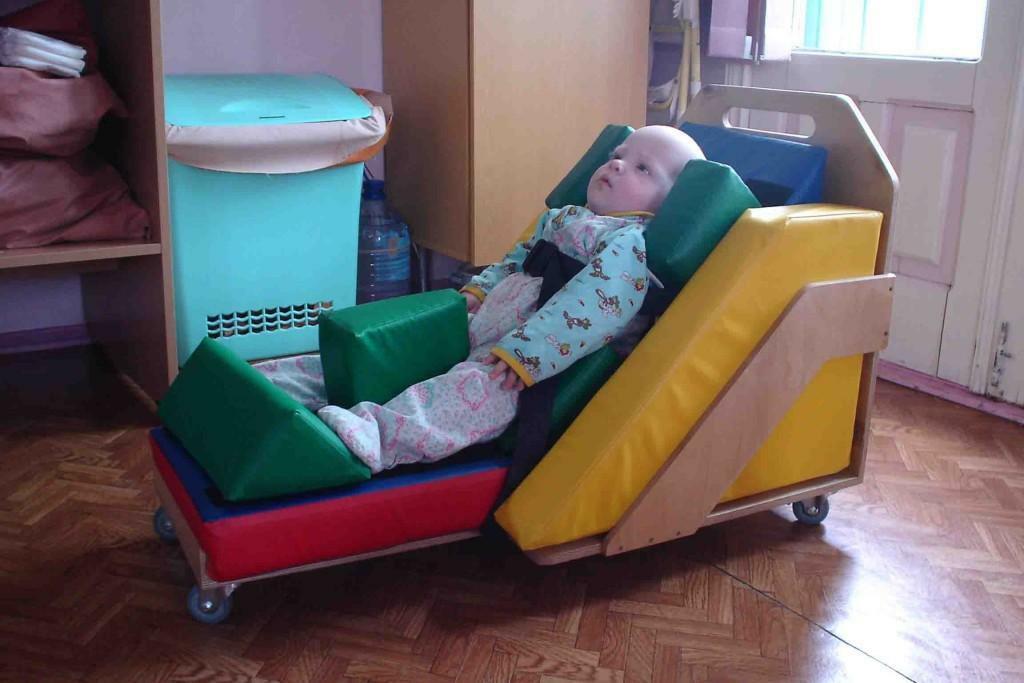Alzheimer's disease is a degenerative pathology that does not heal and causes a progressive decline in intelligence. Often, the disease develops in older people, mostly in women.
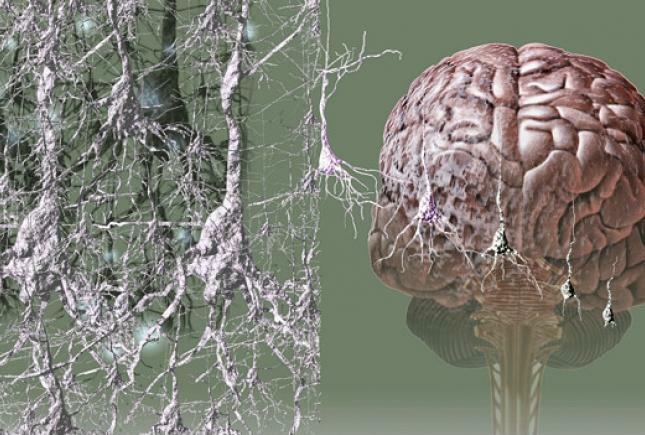
Alzheimer's disease
Most of the patients suffer from that part of the brain that is responsible for knowing the information, perhaps, that's why most of the symptoms relate to memory loss. It becomes difficult for a person to think and remember something, over time the situation is only aggravated. At the last stage speech is disrupted, the patient has an inability to navigate in space and various deviations in behavior. In the end, the body loses all its functions, and the person dies.

What is Alzheimer's disease
Content of the material
- 1 Basic forms of the disease
- 1.1 Senile form of the disease
- 1.2 Presaline form
- 2 The stages of the disease
- 2.1 Video - The third stage of the disease
- 3 Alzheimer's disease last stage: how many live?
- 4 What determines the duration of life?
- 5 How to slow down the progression of the disease
- 5.1 Video - Alzheimer's disease
The main forms of the disease
There are two forms of Alzheimer's disease:
- presenile;
- senile.
Let's consider features of each of them.
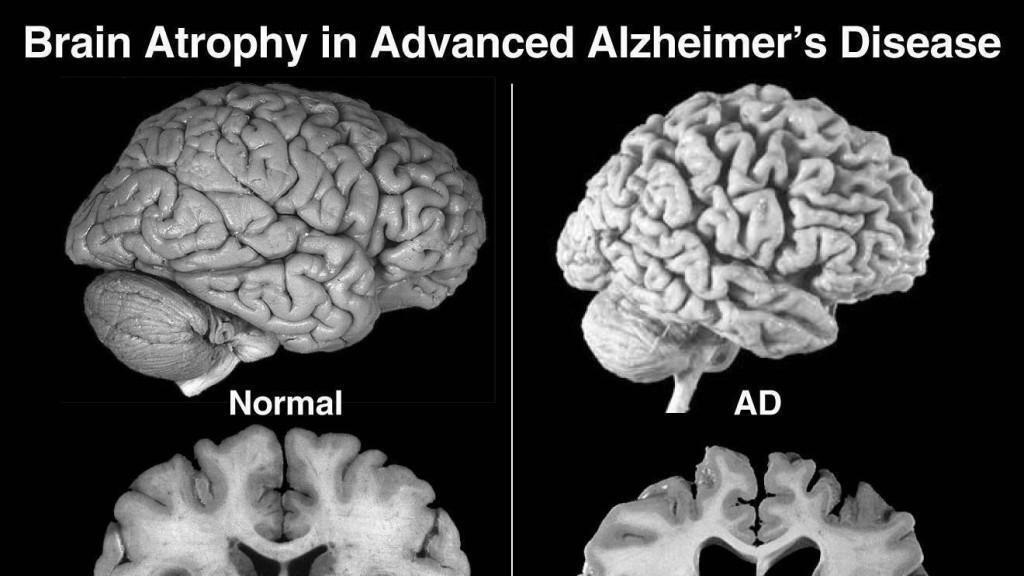
Brain in Alzheimer's disease
Senile form of the disease
occurs in people aged 65 years and the older the person, the greater the risk of developing the disease. It is believed that heredity plays a huge role here, although it can not be proved in all cases.

Alzheimer's disease in people after 65 years of age
The senile form develops slowly, it can last up to 15-20 years. For quite some time the main symptom of the disease is a progressive memory impairment, while the rest of the cognitive functions are not violated so much( at least in the initial stages).
Presenile form

Presenile form of the disease
This form of the disease affects people aged 50 to 65 years. The key factor in this case is the heredity factor: scientists have identified three genes( presenilin 1 and 2, beta-amyloid precursor protein), with mutation of which the described disease develops.
Please note! Progresses this disease faster - almost immediately mnemonic disorders are supplemented by problems with recognition, speech and daily activity. On average, the patient lives from 8 to 10 years.

Rapid progression of the disease
Although it is much more important how he will live them. Therefore, let us recall the peculiarities of the course of the disease, as well as what one can help at some stage of its development.
The stages of the disease
Table. The main stages of the disease
| Stage | Brief description, symptoms |
|---|---|
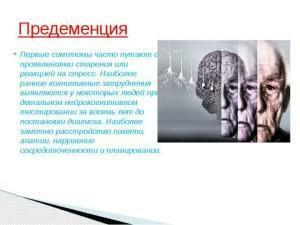 Presence | Symptoms of this stage are easily confused with a reaction to mental stress or banal aging of the body, but in 4 out of 5 cases an accurate diagnosis can be made for health reasons. Memory impairment, combined with permanent apathy - these are the main symptoms of this period. |
 The first stage. Early | It all starts with forgetfulness and loss of short-term memory. It is difficult for a person to choose the right words or solve intellectual problems. Close patients at this stage should show maximum attention and patience, help with what it is difficult to understand. It is recommended to resort to the help of a therapist, and a daily schedule should also be organized. Do not protect the patient from everyday worries. |
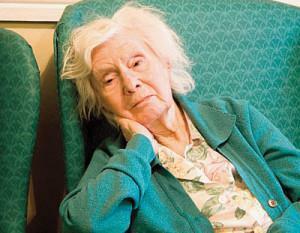 The second stage. Average | Memory deteriorates, a disorder of practical activity is observed, as well as a narrowing of the range of abilities and interests. The person becomes suspicious, practically does not communicate, gets confused in close people and the periods of time. On the street can easily get lost. At the same time, it becomes dangerous not only for oneself, but for others, so relatives should limit the patient from participating in everyday affairs. This stage of the disease is often accompanied by osteoporosis, so a patient who constantly drops things and falls himself needs supervision. |
 The third stage. The last( hard) | The person no longer recognizes the loved ones, his speech is incoherent or consists of individual words. He walks with difficulty, so most of the time he lies in bed. Memory is fragmentary, the patient does not know who he is, although sometimes he can respond to his own name. Practical skills disappear completely. A person needs to be fed from a spoon, follow the stool and urination( diapers).The organism degrades both mentally and physically. On the body there are pressure sores, the patient develops pneumonia and heart failure. |
Video - The third stage of the disease
Alzheimer's disease last stage: how many live?
On average, a person with such a disease lives for another 7-10 years( sometimes more - 15-20), although there are individual factors for each specific case on which the life expectancy depends( we will talk more about them later).Since the moment when the person at the last stage of the disease has lost the ability to move independently, before the lethal outcome takes approximately 6 months. Other diseases that accompany the progression of Alzheimer's disease( influenza, various infections, pneumonia, thromboses, somatic disorders, etc.) lead to death.

How many people live with the diagnosis of Alzheimer's disease
What determines the duration of life?
As mentioned above, it depends on a number of factors. Moreover, the individual forecast is complicated by the fact that it is not always possible to determine how much time has passed from the onset of the disease to the appearance of the first symptoms.
Table. Factors on which the life expectancy of
depends| Description | Short description |
|---|---|
 Age | Studies have been conducted in which a single pattern has been revealed: if the disease begins before age 60, the patient lives for another 15-20 years. If the disease was diagnosed later( at 60-75 years), then no more than 10 years. But if the ailment appears after 85, then the average life expectancy is 4.5 years. |
 Concomitant diseases | In most cases, it is about the elderly, in whom Alzheimer's disease is accompanied by other serious ailments. |
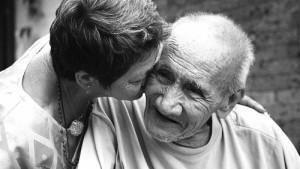 Gender | Sick women live longer than men. |
 Medical treatment, care | Regular use of medicines combined with proper care can prolong the patient a little. |
Please note! According to statistics, Alzheimer's disease ranks sixth in the ranking of common causes of death. And if in other cases there is a tendency to reduce the percentage of deaths, in the case of the described disease, mortality has almost doubled in recent years.
There are no methods of treating Alzheimer's disease yet, but there are a number of measures that can slow its development.
How to slow down the progression of the disease
There are several useful tips, we will get acquainted with them.
- The patient can not be taken to unfamiliar places - this will negatively affect his state of health.

Walking in unfamiliar places is undesirable
- A person needs a moderate climate, because in hot and sunny weather the symptoms are stronger.
- In Alzheimer's disease, loneliness is contraindicated. Deficiency of communication and even short-term loneliness can cause panic attacks.

Communication and care important
- Infectious diseases should be completely excluded. To support the immune system, you can use folk remedies( currants, sea buckthorn).You also need the use of immunomodulators( such as Arbidol), because bacterial or viral infections can significantly worsen the patient's condition.

Be sure to strengthen the immunity of

Arbidol
- The intake of medications should be limited, because among them there are none that would not adversely affect the body. Therefore, you need to constantly monitor your health, so that there is no need for constant medication.
- The light does not need to be turned off even at night - the patient should constantly hear and see well. If there is a problem with hearing or vision, then you need to choose a hearing aid or glasses - this will prevent depression, which often occurs in Alzheimer's disease. If a person is in total darkness, hallucinations or convulsions that pose a danger to life can begin.

The patient should be in the room around the clock light
As a result, we note that the described ailment is a complex test not only for the patient, but also for his loved ones. Modern medicine here is powerless, the disease will inevitably develop and nothing can be done about it. But you can extend life a little, improve its quality, for which you should take advantage of the above recommendations.


